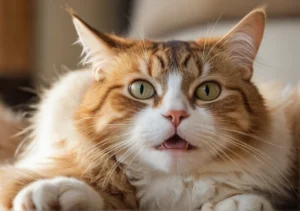Cats nipping at their owners can be a surprising and sometimes painful behavior. But why do cats nip humans? Let’s explore the reasons behind this common feline behavior.
Cats nip humans for various reasons, such as play, attention-seeking, or overstimulation. Understanding the motivations behind this behavior can help owners interact with their feline friends more effectively. Now, let’s delve into the different aspects of why cats nip humans.
Natural Instincts
Cats’ natural instincts play a significant role in why they nip humans. Firstly, cats are natural hunters, and nipping is a way for them to practice their hunting skills. When a cat nips, it’s mimicking the behavior of catching prey, which is ingrained in their DNA. Additionally, play is a crucial part of a cat’s instinctual behavior. Nipping during play is their way of engaging and interacting, much like how kittens playfully bite each other while growing up. Understanding these natural instincts can help us better comprehend why our feline friends nip us.
Communication
Nipping is also a form of communication for cats. It’s their way of expressing emotions or needs to their owners and other felines. For instance, a gentle nip might indicate affection, while a more forceful nip could signal annoyance or overstimulation. By paying attention to the context and body language accompanying the nip, we can decipher what our cat is trying to convey. Additionally, cats use nipping to establish boundaries with other cats or humans, setting limits on how much interaction they’re comfortable with. Remember, nipping is just one of the many ways cats communicate, so being attuned to their non-verbal cues is key to fostering a strong bond with your feline companion.
- Captivating Insight: Cats also use nipping as a form of discipline, especially with kittens. By gently nipping, older cats teach younger ones about acceptable behaviors and boundaries in their environment. This helps to maintain order within their social structure and ensure everyone plays nice.
Training Tips
If your cat has a habit of nipping, don’t worry – you can train them to stop this behavior. When your cat nips, let out a small yelp to show that it hurts, just like another cat would do. This helps them understand that nipping is not acceptable. Additionally, provide plenty of toys for your cat to play with – interactive toys can help redirect their biting behavior. Consistency is key in training, so be patient and diligent in reinforcing positive behaviors. Remember, training takes time and effort, but it’s worth it for a happy and well-behaved feline friend.
Stress and Anxiety
Cats may nip their owners as a response to stress and anxiety. To help alleviate these issues, create a calm and peaceful environment for your cat. Provide hiding spots, cozy beds, and vertical spaces for them to feel secure. Regular play sessions and interactive toys can help reduce stress and anxiety levels. If you notice persistent nipping behavior, consider consulting with a veterinarian or animal behaviorist for additional support. Remember, a happy and stress-free cat is less likely to exhibit nipping behavior.
Additional Unique Insight: It’s essential to understand that nipping is a form of communication for cats. By paying attention to your cat’s body language and the context of their nipping, you can better address the underlying reasons for this behavior. Remember, cats nip not out of malice, but as a way to express themselves.
Medical Concerns
If Fluffy suddenly starts nipping more than usual, it could be a sign of an underlying medical issue. Dental problems, skin irritation, or even arthritis could be causing discomfort, leading to the nipping behavior. If you notice a change in your cat’s behavior, it’s crucial to take them to the vet for a check-up. Remember, our feline friends can’t tell us when something’s wrong, so it’s up to us to pay attention to their signals. Don’t delay seeking veterinary advice if you have any concerns about your cat’s health.
Redirecting Behavior
When Mittens starts nipping at your fingers, it can be frustrating. To redirect this behavior, provide appropriate outlets for their natural instincts. Invest in engaging toys like interactive feeders or feather wands to satisfy their hunting instincts. If they start nipping during petting sessions, pay attention to their body language. Watch for signs of overstimulation like twitching tail or flattened ears, and give them a break if needed. Remember, redirecting their energy towards positive activities can help prevent unwanted nipping behavior.
- Provide scratching posts: Cats love to scratch, and having a designated post can help redirect their need to scratch away from your hands.
- Use positive reinforcement: Reward good behavior with treats or praise to encourage them to continue positive interactions.
- Avoid punishment: Never hit or yell at your cat for nipping. This can lead to fear and aggression, worsening the behavior. Instead, focus on redirection and positive reinforcement.
Play and Enrichment
Feline nipping behavior can often be a result of boredom or lack of mental stimulation. Engaging your cat in regular play sessions and providing enriching activities can help redirect this behavior. Consider interactive toys, puzzle feeders, or even creating a DIY obstacle course for them to explore. By keeping your cat entertained and mentally stimulated, you can help prevent them from nipping out of frustration or pent-up energy. Remember, a tired cat is a happy cat!
Interesting Feline Facts
Did you know that cats have a special organ called the Jacobson’s organ, located on the roof of their mouth, that helps them “taste” scents in the air? This explains their quirky behavior of “flehmening” when they encounter a new smell. Additionally, cats have a remarkable ability to rotate their ears 180 degrees to pinpoint the source of a sound. Next time you see your feline friend doing something peculiar, just remember – they are mysterious creatures with fascinating abilities!
Extra tip: Place a bird feeder outside a window where your cat can watch birds. This simple act can provide hours of entertainment for your feline friend, preventing boredom and reducing the urge to nip.
Alex, a passionate animal lover, has experience in training and understanding animal behavior. As a proud pet parent to two dogs and three cats, he founded AnimalReport.net to share insights from animal experts and expand his knowledge of the animal kingdom.




